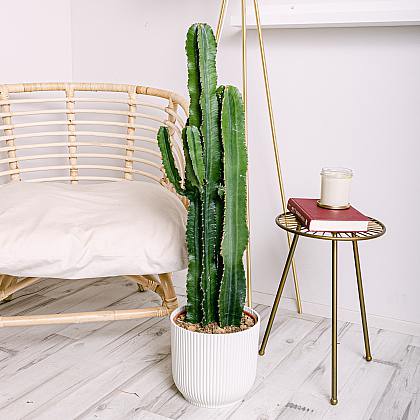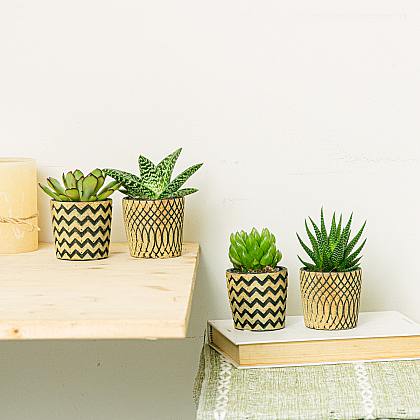Plants for mental well-being at home: learn how to buy and care for them to improve your quality of life
Plants are essential elements in creating an environment of mental well-being in the home. Not only are they beautiful and decorative, but they also have numerous benefits for our mental health
Plants are essential elements in creating an environment of mental well-being in the home. Not only are they beautiful and decorative, but they also have numerous benefits for our mental health. In this article, we'll provide you with helpful tips for choosing and caring for the right plants for your home, as well as information about the benefits they bring to our health. We'll also explore the power of soothing scents and medicinal plants that can help us relieve stress and anxiety. Finally, we'll give you ideas on how to incorporate plants into your daily routine to fully enjoy their mental wellness benefits.
The Importance of Plants in Mental Well-Being
Plants can have a significant impact on our mental well-being. According to various studies, having plants in the home or workplace can reduce stress, improve mood, and increase productivity. Plants are a natural source of oxygen and help purify the air, which can be beneficial for those suffering from respiratory problems. Additionally, caring for plants can be a relaxing and rewarding activity that helps take your mind off daily worries. The presence of plants can also improve sleep quality, which is essential for maintaining good mental health. In addition, plants can help reduce eye strain caused by spending long hours in front of computer screens or mobile devices. Some plants can even act as natural filters to absorb certain air pollutants, such as formaldehyde and benzene, which can be especially beneficial for those who live in urban areas with high levels of air pollution. In short, plants can be a valuable tool for improving our mental and physical health. Incorporating a few plants into our home or workplace can make a huge difference in our quality of life and overall well-being.
How to Choose the Right Plants for Your Home
When choosing plants for the
home, it is important to consider several factors to ensure that the plants are adapted to their environment and easy to care for. First, consider the lighting in your home. Do you have large windows that allow for a lot of natural light, or do you live in a space with little natural light? Plants that require a lot of light include cacti and succulent, while plants that need less light include snaketongue and peace lily. Also, consider the temperature and humidity in your home. If you live in a dry climate, look for plants that prefer a dry environment, such as cactus or spider plant. If you live in a humid climate, look for plants that prefer a humid environment, such as fern or bromeliad. It's also important to consider the size and shape of the plants. If you're short on space, look for smaller plants like succulents or bonsai. If you want to add height to a room, look for taller plants like rubber tree or bamboo palm. Lastly, consider your plant care skills. If you're a beginner, look for easy-to-care plants like the ZZ plant or spider plant. With these considerations in mind, you can choose the right plants for your home and enjoy the mental wellness benefits they offer.
Tips for taking care of your plants and keeping them healthy
Tips to take care of your plants and keep them healthy:
1. Water properly: It is important to know the water needs of each plant and adjust the frequency and amount of watering accordingly. Avoid overwatering, as it can lead to root rot, and make sure the water drains properly.
2. Provide the right amount of light: Every plant has different light requirements. Some can thrive in low-light locations, while others need direct sunlight. Be sure to place your plants in areas where they will receive the right amount of light for healthy growth.
3. Maintain a proper temperature: Plants are also sensitive to extreme temperatures. Avoid placing them near drafts of cold air or intense heat, as this can damage them. Keep a constant room temperature and avoid sudden changes.
4. Fertilize regularly: To keep your plants healthy, you need to provide them with the right nutrients. Use organic or plant-specific fertilizers and follow the recommended application instructions.
5. Control pests and diseases: Plants can be affected by pests such as aphids or diseases such as powdery mildew. Perform regular inspections for any signs of infestation or disease and take immediate action to control them.
6. Prune when necessary: Regular pruning helps promote healthy growth and maintain the desired shape of the plant. Remove dead or diseased branches, as well as any overgrowth that may affect their development.
By following these tips, you can take proper care of your plants and keep them healthy, which will help create a harmonious environment in your home and promote your mental well-being.
Benefits of Having Plants at Home for Mental Health
Having plants at home can provide numerous mental health benefits. Scientific studies have shown that being in contact with nature, including through plants in the home, can reduce stress and anxiety levels, improve mood, and promote an overall sense of well-being. Plants are able to purify the air, removing toxins and releasing fresh oxygen, which can improve the quality of the indoor environment and promote healthier breathing. In addition, caring for plants and watching them grow can be a relaxing and rewarding activity, helping to distract the mind from worries and negative thoughts. The presence of plants in the home can also foster connection with nature and provide a sense of calm and serenity. Even just contemplating its beauty and variety of colors can have a positive effect on mood and stimulate creativity. In short, having plants at home is not only aesthetically pleasing, but it can also contribute significantly to mental well-being by reducing stress, improving mood, and promoting an overall sense of calm and serenity.
The Power of Scents: Plants with Relaxing Fragrances
The Power of Scents: Plants with Relaxing Fragrances
Plants are not only visually appealing, but they can also stimulate our senses through their scents. Some plants have soothing fragrances that can help improve our mental well-being at home. One of these plants is lavender, known for its soft, floral scent. The smell of lavender has been used for centuries to relieve stress and promote relaxation. Placing a bouquet of lavender in a room can create a calm and serene atmosphere.
Another plant with a soothing fragrance is jasmine. Its sweet and exotic aroma has calming properties that can reduce anxiety and improve mood. Having a jasmine plant in your home can help you relax after a hectic day.
Rosemary is another plant that offers a soothing aroma. In addition to being used in cooking, rosemary also has relaxing and stimulating properties for the mind. Its fresh, herbal aroma can help relieve tension and improve concentration.
If you're looking for a plant with a soothing but more subtle fragrance, consider gardenia. Its white flowers emit a sweet, delicate smell that can calm nerves and promote a calm atmosphere.
In short, plants with soothing fragrances can have a positive impact on our mental well-being at home. Lavender, jasmine, rosemary, and gardenia are just a few of the many options available. Experiment with different plants and find out which ones give you the most benefit in terms of relaxation and tranquility in your home.
Medicinal Plants to Relieve Stress and Anxiety
Medicinal plants are an excellent natural option for relieving stress and anxiety. Some of the most effective plants for this purpose are lavender, valerian, and chamomile. Lavender is known for its soothing scent, which helps reduce anxiety and promote a state of calm. You can use lavender essential oil in a diffuser or add a few drops in your bath to enjoy its relaxing benefits. On the other hand, valerian is a plant with sedative properties that helps you fall asleep and reduce stress symptoms. You can prepare an infusion with its dried roots and drink it before going to sleep to promote a restful rest. Chamomile, on the other hand, is known for its soothing and digestive properties. You can enjoy a cup of hot chamomile tea to relax after a hectic day. Remember to consult with a specialist before using any medicinal plant, especially if you are pregnant or have any pre-existing medical conditions. Herbal medicines can be a great help in relieving stress and anxiety, but it's important to use them responsibly and safely.
Enjoying Wellness: How to Incorporate Plants into Your Daily Routine
Enjoying the well-being that plants provide in our home is easier than it seems. To incorporate them into our daily routine, we can start by placing them in strategic places, such as the work table or the bedside table. In this way, we will be able to enjoy its benefits throughout the day. In addition, we can dedicate a few minutes a day to take care of them and water them, which will help us relax and disconnect from the daily routine. Another way to enjoy the well-being that plants offer us is through their aroma. We can opt for plants with relaxing fragrances, such as lavender or jasmine, and incorporate them into our home through candles or essential oils. We can also use medicinal plants to relieve stress and anxiety, such as valerian or chamomile. In this case, we can prepare infusions and enjoy their relaxing properties while reading a book or watching a movie. In short, incorporating plants into our daily routine is a simple and effective way to improve our mental and emotional well-being.
In short, plants are a valuable tool for improving mental well-being at home. In addition to their aesthetic beauty, plants have therapeutic and medicinal properties that can help relieve stress and anxiety. Taking care of them and enjoying their scents and colors can be a simple and effective way to incorporate nature into our daily lives. However, it's important to remember that each person has unique needs and preferences, so it's critical to choose the right plants for our home and lifestyle. At the same time, we must be aware of the importance of preserving the environment and protecting the biodiversity of plant species. In this sense, reflecting on how we can incorporate plants into our lives without harming our natural environment is a key point to continue enjoying their benefits in the future


